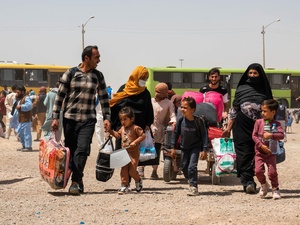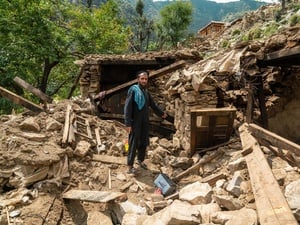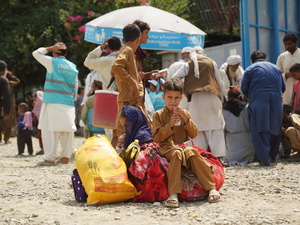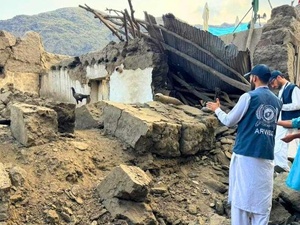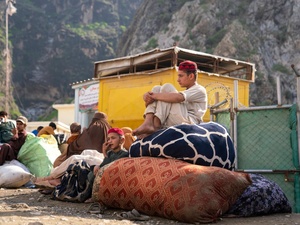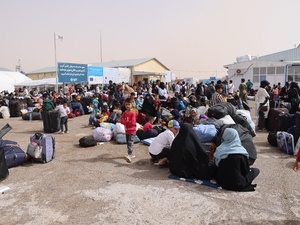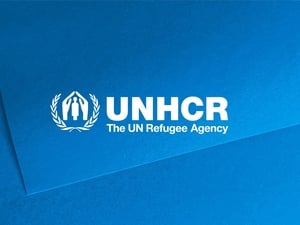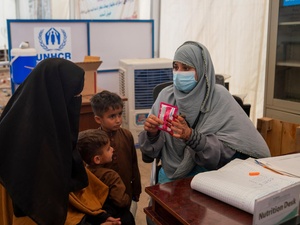Feature: Aid drying up in Afghanistan's Spin Boldak region
Feature: Aid drying up in Afghanistan's Spin Boldak region
Liberian refugees in Sierra Leone. There have been more than 6,600 new arrivals in recent days.
SPIN BOLDAK, Afghanistan, June 26 (UNHCR) - At the height of the US-led bombing campaign in late 2001, hundreds of thousands of Afghans fled their homes seeking safety, relief aid, and to escape bandits who came out of the woodwork as the Taliban regime collapsed.
By mid-October 2001, thousands of displaced people had converged on Spin Boldak, a border town located on the southern edge of Afghanistan's Kandahar province, where several Muslim non-governmental organisations (NGOs) established relief operations.
Many Afghans also found their way into neighbouring Pakistan's Baluchistan province, where UNHCR now cares for some 100,000 people in several new sites and an encampment called the "waiting area" at Chaman, just inside Pakistan's frontier.
But many other Afghans were not allowed to cross the border, or stopped at the makeshift camps near Spin Boldak, where Muslim NGOs provided ample relief supplies, at least for a few months.
UNHCR's Mark Rutgers, who heads aid efforts in the dusty trading post, said the Muslim NGOs played a vital role providing relief aid in the area during a period when most other relief agencies had withdrawn due to security concerns.
"Arab NGOs were more welcome and had more facilities," he said. "Security-wise, they were also less affected at a time when other international NGOs were forced to withdraw from Spin Boldak and Chaman due to security problems."
But aid can be a magnet in impoverished Afghanistan, where most people suffer from persistent poverty and the combined effects of war and drought.
Spin Boldak is now bracketed by five sprawling makeshift camps that shelter an estimated 32,000 internally displaced persons (IDPs), said Rutgers.
He added that in recent weeks, more than 5,000 Afghans have opted to leave the windswept sites, boarding UNHCR-hired trucks and heading home to receive the agency's returnee kits containing plastic tarpaulin, blankets, buckets, jerry cans, hygienic supplies for women and other items, along with food aid from the UN World Food Programme.
For the thousands of Kutchi nomads who now dominate Spin Boldak's IDP camps, the future is more uncertain, said Rutgers.
"One Kutchi man told me how he lost 200 sheep and 10 camels due to the drought, and now his herd is down to only two goats," said Rutgers. "The Kutchi's traditional grazing lands are drought-affected, they've lost their herds, and they're slowly losing their skills and way of life. It'll be much harder to get them out of camps in the current situation."
Nevertheless, UNHCR hopes that more of Spin Boldak's displaced Afghans will opt to go home if they get the necessary assistance, and feel safe. Rutgers said more than 1,000 people have signed up to return to Balkh, Faryab, Jowzjan and Samanghan provinces in northern Afghanistan, but security conditions are not yet satisfactory for the UN refugee agency to transport these volunteers back home.
Inter-ethnic tension and the violence that erupted in some areas of the north beginning late last year are still a problem, according to some of the Afghans in Spin Boldak's camps.
Abdul Nasir, 27, recently fled northern Afghanistan's Jowzjan province with his wife and child due to harassment by bandits targeting some minority communities. They arrived in one of Spin Boldak's IDP camps a month ago.
"People were having to pay fines just for being Pashtun," said Nasir. "Big commanders didn't seem to be involved, only masked men, from the lower ranks."
Outside his patchwork shelter, five bone-thin camels wandering through the camp nose their way through garbage in case the impoverished Afghans have thrown away anything remotely edible.
If relief agencies would offer him aid somewhere else, Nasir said he would be happy to leave the dusty camp, where supplies are now running short following a decision by the Muslim NGO that ran the site to pull out in early June.
"If I could live someplace in dignity and honour, and if some assistance were available, of course I'd go," said Nasir. "For the time being, I'm here because there's aid, and since this is a border area, at least there's some work available."
The situation of Spin Boldak's camps became more uncertain when two of the largest Muslim NGOs operating in the dicey border zone decided to withdraw. On June 6, the World Assembly of Muslim Youth (WAMY) and the International Islamic Relief Organization announced they were pulling out from two camps they supported, which together host more than 7,000 IDPs.
UNHCR stepped in temporarily, and is funding water deliveries to the camps. Pakistan-based NGO Al-Akhtar Trust, which already managed the second-largest of Spin Boldak's five camps, helping 8,000 persons, announced it was prepared to take on the two sites, but only with outside funding.
But the UN refugee agency is facing its own financial problems dealing with the unprecedented pace of the Afghan repatriation and the fact that some donors have been slow to provide funds to support its $271-million operation in the region. The agency is itself hesitant to take on new commitments.
More alarming for Spin Boldak's IDPs, UNHCR has not found any new NGOs interested in expanding their activities to the border camps.
"NGOs say they are having great difficulty finding sufficiently qualified staff to cover their needs in Afghanistan, particularly in water and sanitation," said UNHCR's Rutgers.
The future of southern Afghanistan's more than 400,000 IDPs depends upon an improvement in security in their home regions, and upon agencies like UNHCR and its partners to deliver assistance and help people back home. But if the uncertainty of the relief effort in Spin Boldak's camps is any indication, getting displaced Afghans home will be no easy task.


